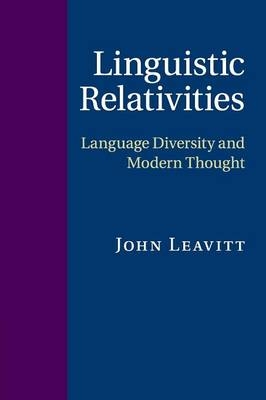
Linguistic Relativities
Language Diversity and Modern Thought
Seiten
2015
Cambridge University Press (Verlag)
978-1-107-55863-2 (ISBN)
Cambridge University Press (Verlag)
978-1-107-55863-2 (ISBN)
Does the language you speak influence your thought and world view? This book offers a history of responses to this question over the last half millennium: usually a simple yes (Renaissance, Romantics, Neoromantics) or no (Enlightenment, most cognitive science), but sometimes more nuanced explorations (Boasian linguistics, recent work in cognition).
There are more than six thousand human languages, each one unique. For the last five hundred years, people have argued about how important language differences are. This book traces that history and shows how language differences have generally been treated either as of no importance or as all-important, depending on broader approaches taken to human life and knowledge. It was only in the twentieth century, in the work of Franz Boas and his students, that an attempt was made to engage seriously with the reality of language specificities. Since the 1950s, this work has been largely presented as yet another claim that language differences are all-important by cognitive scientists and philosophers who believe that such differences are of no importance. This book seeks to correct this misrepresentation and point to the new directions taken by the Boasians, directions now being recovered in the most recent work in psychology and linguistics.
There are more than six thousand human languages, each one unique. For the last five hundred years, people have argued about how important language differences are. This book traces that history and shows how language differences have generally been treated either as of no importance or as all-important, depending on broader approaches taken to human life and knowledge. It was only in the twentieth century, in the work of Franz Boas and his students, that an attempt was made to engage seriously with the reality of language specificities. Since the 1950s, this work has been largely presented as yet another claim that language differences are all-important by cognitive scientists and philosophers who believe that such differences are of no importance. This book seeks to correct this misrepresentation and point to the new directions taken by the Boasians, directions now being recovered in the most recent work in psychology and linguistics.
John Leavitt is a Professor in the Department of Anthropology at the University of Montréal.
Introduction; 1. A passage to modernity; 2. One reason, one world, many monads; 3. The world at war with reason: Britain and France in the eighteenth century; 4. Multiplicity and the Romantic explosion; 5. Essences and universals through the nineteenth century; 6. Boas and the linguistic multiverse; 7. Linguistic relativity: Sapir, Lee, and Whorf; 8. The other side of the mirror: a twentieth-century essentialism; 9. The rise of cognition and the repression of languages; 10. The return of the repressed; Conclusion.
| Zusatzinfo | Worked examples or Exercises; Printed music items |
|---|---|
| Verlagsort | Cambridge |
| Sprache | englisch |
| Maße | 152 x 229 mm |
| Gewicht | 390 g |
| Themenwelt | Geisteswissenschaften ► Philosophie ► Sprachphilosophie |
| Geisteswissenschaften ► Psychologie ► Verhaltenstherapie | |
| Geisteswissenschaften ► Sprach- / Literaturwissenschaft ► Sprachwissenschaft | |
| Sozialwissenschaften ► Ethnologie | |
| Sozialwissenschaften ► Soziologie | |
| ISBN-10 | 1-107-55863-8 / 1107558638 |
| ISBN-13 | 978-1-107-55863-2 / 9781107558632 |
| Zustand | Neuware |
| Haben Sie eine Frage zum Produkt? |
Mehr entdecken
aus dem Bereich
aus dem Bereich
Aspekte einer Ontologie des Logos
Buch | Hardcover (2024)
Springer Fachmedien (Verlag)
CHF 167,95
Wie die Menschheit zu ihrer größten Erfindung kam
Buch | Softcover (2022)
C.H.Beck (Verlag)
CHF 25,20
Macht und Legitimität politischer Sprache im Prozess der europäischen …
Buch | Softcover (2023)
Nomos (Verlag)
CHF 103,60


